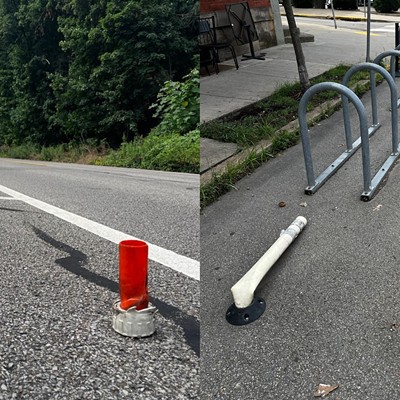It's the constant, casual use of "gay" and "fag" as epithets that gets to you, says Sam Brown.
Brown, 18, is president of the dozen-member Gay-Straight Alliance at Sewickley Academy, a private school of about 900 students in this northern suburb.
"It's really a risky club to be in," he says. Last year the club was even led by a straight girl, Brown says, but students are still worried about being labeled because of their membership, or that their parents will be upset.
A senior, Brown is also student council president of the Senior School, which houses the Academy's 9th-12th graders.
Since Brown was a freshman, Sewickley students have participated in the national Day of Silence, when gay students and their allies remain quiet in solidarity with those who feel they need to remain closeted.
"A lot of people participate, but just to be quiet," Brown laments.
Last year, Sewickley's Alliance group tried to get school approval for Day of Silence participants to wear "Gay? Fine By Me" T-shirts, sold by a group at Duke University, but school administrators did not allow it. So the Alliance produced their own shirts, with "Silenced" on one side and "Fighting for Human Rights" on the other. About 50 people donned them.
This year, for the Day of Silence on April 13, Brown was determined to see the Duke-produced shirts in his school.
"And I said no," says Bruce Houghtaling, head of the Senior School. "I said I fully supported whatever speeches might be made, and I fully supported the Day of Silence." But the shirt's slogan, he explained, might engender questions as Middle and Lower School students -- the Academy includes even pre-K kids -- mingle outside the buildings, questions "that would be hard to answer.
"Then I found that they were going to go ahead and wear it anyway," Houghtaling says, "and I advised them that there might be a consequence to that."
Brown wasn't sure what that consequence might be. Thirty kids had signed up to participate in the Day of Silence, and he hadn't even told them about purchasing 50 shirts on his own to distribute at the last minute. He asked participants to show up to school on April 13 with the shirts on but covered.
At the Senior School's morning announcements, for which the students all gather in the Commons, Brown played a speech he had recorded so as not to break his own silent day. Then he unzipped his jacket to reveal the shirt.
After a pause, he says, "the whole school applauded."
Those revealing their shirts were asked to cover them back up, but "the administration didn't try that hard to stop it," Brown says. A few anti-gay screeds on the school's public comment wall were soon outnumbered by pro-gay sentiment. But the public debate went on for two weeks, he says, and Brown's stash of shirts sold out.
Brown calls the day "More wildly successful than I had even imagined. It was overall very productive and positive."
Even Houghtaling calls the Day of Silence "very successful. The kids here who chose to wear the T-shirts anyway got a pretty good lesson in civil disobedience" -- although no one was disciplined for their actions. "This school is far ahead of other schools I've been at in tolerance of all different types of people," he says. Most private schools at which he has worked "couldn't tolerate" a Gay-Straight Alliance "and the students wouldn't perhaps be interested in it."
[[Space break]]
Brown and other students will tell their stories at the annual meeting of the city's Gay, Lesbian, and Straight Education Network chapter on June 13.
"Anti-gay language is the most prevalent name-calling and slang [in schools] and the least restrained by interventions," says GLSEN Pittsburgh co-chair Alice Greene of Point Breeze. "Teachers would like to intervene but they don't know how to intervene without opening up a discussion about sexuality. That might be a good discussion to have," but beside the point in this case. Anti-gay harassment should be treated the same as any bullying, she says. The group trains current and future educators in creating safer school environments.
About half their training sessions, which reach approximately 1,000 people each year, are offered via the University of Pittsburgh, including many through their School of Education, says GLSEN Pittsburgh Program Coordinator Steve Orner of Morningside. "It's not easy for us to get on campus" at area high-schools, he says. "When they hear 'gay' they think we're talking about sex. We're talking about respect."
On June 13, GLSEN will be honoring Pitt Education Dean Alan Lesgold for his commitment to such anti-bullying programs. The event will also include a performance by the local Dreams of Hope group, which offers the perspective of students 14-21 years old on being gay or other minorities, followed by a question-and-answer session.
"The emotions around gay issues [tend] to be so high-pitched among adults that students are being caught in the crossfire," says Greene. "Is the presence of gay people in our world going to be something we acknowledge or not?" Sam Brown, Greene remarks, "really got people talking. He got to push the boundaries a bit.
"These kids are feeling the amount of adult discomfort with the whole topic. And what does that say to our kids?"
June 13, City Theatre, South Side. For time and other info, see www.glsenpgh.org.














